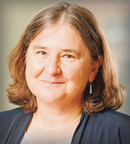As the number of older patients with cancer continues to rise, interventions that reduce the high rates of symptoms, toxicity, and distress in this population are urgently needed. Research presented during the 2020 ASCO Quality Care Symposium has added to the growing body of evidence supporting geriatric assessment, leading one expert to recommend the comprehensive diagnostic process for all older patients starting systemic treatment. Results of the national cluster randomized trial showed that an intervention with geriatric assessment reduced both clinician-rated toxicity and symptomatic toxicity reported by patients with advanced cancer.1
“Providing a geriatric assessment summary with management recommendations to oncologists prior to the start of a new treatment regimen resulted in both objective and subjective benefits to patients,” said lead study author, Eva Culakova, PhD, MS, Research Assistant Professor at the University of Rochester Medical Center, New York.
As Dr. Culakova reported, older adults with advanced cancer have a high prevalence of aging-related conditions and symptoms, which increase the risk of toxicities, and poor treatment tolerability, which can negatively impact outcomes.

Eva Culakova, PhD, MS
Furthermore, these patients are underrepresented in randomized clinical trials that define the standards for cancer treatment.
Geriatric assessment, which was developed to identify aging-related impairments, evaluates up to eight geriatric domains, such as cognition or nutrition, and may be used to guide care management. For example, said Dr. Culakova, a visit to a dietician may be recommended for a patient with impaired nutrition.
Study Methods
The Geriatric Assessment for Patients 70 and Older (GAP 70+) study was conducted by the University of Rochester Cancer Control Research Base. It enrolled 41 community oncology practices within the National Cancer Institute Community Oncology Research Program Network across the United States. Practice clusters were randomly assigned to either geriatric assessment intervention or usual care.
Eligible patients were 70 years or older, had incurable solid tumors or lymphoma, and had at least one age-related impairment other than polypharmacy. Patients also had to be initiating a new treatment regimen with chemotherapy or other agents with a higher risk of toxicity.
The primary aim of the GAP 70+ study was to evaluate the effect of geriatric assessment intervention on clinician-rated grade 3 to 5 toxicities as captured by Common Terminology Criteria for Adverse Events (CTCAE). Data presented at the ASCO20 Virtual Scientific Program demonstrated a reduction in grade 3 to 5 toxicity in the geriatric assessment–guided intervention vs the usual-care arm (50% vs 71%).2
The aim of this analysis was to assess whether the intervention also could reduce symptomatic toxicity as measured by a patient-reported outcomes version of the CTCAE (PRO-CTCAE).
Positive Effect on Symptomatic Toxicities
As Dr. Culakova reported, 718 patients provided PRO-CTCAE data and were included in the analysis. The average age of patients was 77 years, approximately 40% were women, and the most common cancer types were gastrointestinal and lung.
Baseline levels of symptoms were very high, said Dr. Culakova, with more than 80% of patients reporting at least one moderate symptom and nearly half of patients reporting at least one severe symptom. Fatigue and pain were the most common symptoms.
According to Dr. Culakova, the intervention had a positive effect on symptomatic toxicities. Fewer patients in the intervention arm experienced symptomatic grade 2 or greater toxicity than in the usual-care arm (76.5% vs 84.7%), which resulted in an adjusted risk ratio of .091 favoring the intervention arm (P = .05).
This positive effect also remained when the investigators restricted to 12 core symptoms, including fatigue, insomnia, pain, anorexia, and dyspnea. In the intervention arm, 72% of patients reported toxicity on one of the core symptoms vs 82% of patients receiving usual care (P < .01).
A similar trend persisted for grade 3 or greater toxicities, said Dr. Culakova, with fewer patients in the intervention arm experiencing severe and very severe toxicities compared with those who received usual care. That score, based on all 24 symptoms that collected severity, however, did not retain statistical significance after adjusting for practice effects.
When the investigators restricted to the 12 core symptoms, 46% of patients experienced grade 3 or higher symptoms with geriatric assessment vs 54% with usual care (P = .05).
Study Limitations
Dr. Culakova acknowledged a “high likelihood of imbalance between the arms,” which is a limitation of practice-cluster randomized trials. However, this problem was mitigated by a pragmatic approach to adjusting for practice effects, she said.
In addition, Dr. Culakova noted methodologic challenges specific to PRO-CTCAE symptom data that could bring opportunities for future research, especially for statisticians.
“There are multiple methodologic questions that need better solutions,” Dr. Culakova concluded. “This is an opportunity for multidisciplinary collaboration with the common goal of providing better care for patients.”
DISCLOSURE: Dr. Culakova reported no conflicts of interest.
REFERENCES
1. Culakova E, Mohile SG, Xu H, et al: Effects of a geriatric assessment intervention on symptomatic toxicity burden reported by older adults with advanced cancer during treatment. 2020 ASCO Quality Care Symposium. Abstract 138.
2. Mohile SG, Mohamed MR, Culakova E, et al: A geriatric assessment intervention to reduce treatment toxicity in older patients with advanced cancer: A University of Rochester Cancer Center NCI community oncology research program cluster randomized clinical trial. ASCO20 Virtual Scientific Program. Abstract 12009.

